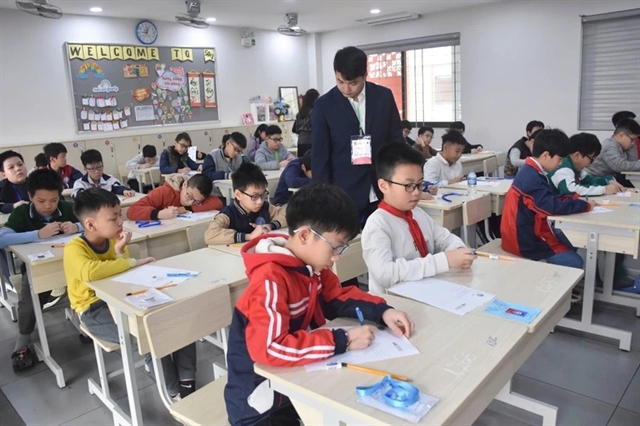 Society
Society


|
| Primary students take an English exam in Hà Nội. Việt Nam will make English a compulsory subject from Grade 1 by 2030 under a national strategy to make it the country’s second language. — VNA/VNS Photo |
HCM CITY — Việt Nam will make English a compulsory subject from Grade 1 by 2030 as part of a national strategy to turn it into the country’s second language and strengthen global competitiveness, the government has announced.
The goal is outlined in a new programme titled “Bringing English as a second language in schools for the 2025-2035 period, with a vision to 2045,” approved earlier this week by the Ministry of Education and Training (MoET).
Under the plan, all primary schools nationwide will be required to teach English from the first grade, replacing the current policy that makes it compulsory only from Grade 3. Schools with adequate teachers and facilities are encouraged to begin earlier.
The ministry said the initiative aims to improve English proficiency and build a “foreign-language ecosystem” across the education system to help prepare a generation of globally competent citizens.
Schools will be assessed at three levels based on teaching quality, the use of English in learning environments, curriculum design, digital learning tools, teacher capacity, and international collaboration.
By 2030, at least 20 per cent of schools are expected to reach Level 1, 5 per cent Level 2, and 2 per cent Level 3, rising to 50, 20, and 15 per cent, respectively, by 2045.
Preschools will also be required to introduce English within five years, with 10 per cent meeting Level 1 standards by 2030 and half by 2045.
At the university level, 50 per cent of institutions are expected to meet Level 2 and 35 per cent Level 3 by 2035.
To support implementation, the ministry plans to upgrade teacher training, apply digital and AI-based learning tools, and expand international cooperation.
It estimates Việt Nam will need an additional 12,000 English teachers for preschools and 10,000 for primary schools, along with retraining or upskilling 200,000 teachers to teach in English by 2030.
The move follows a 2023 directive from the Politburo calling for stronger foreign-language education and the gradual adoption of English as a second language in schools to meet the country’s integration and development goals.
By 2035, the ministry expects all students to study English as a second language. — VNS




